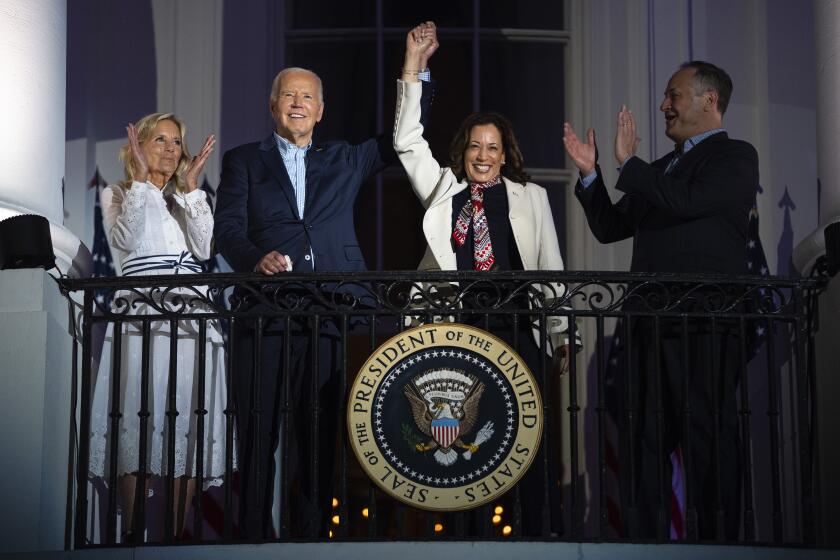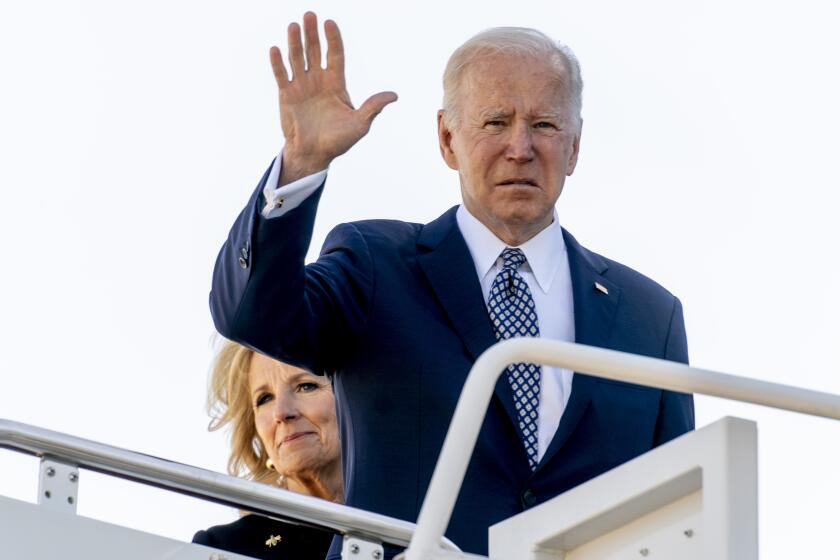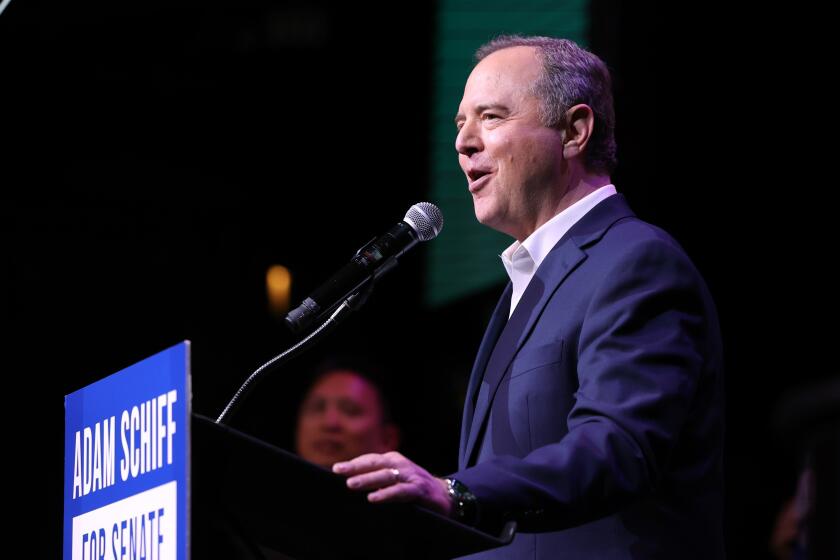Biden drops out, endorses Kamala Harris as Democratic presidential nominee

- Share via
President Biden withdrew from the presidential race Sunday and threw his support behind Vice President Kamala Harris as the Democratic Party’s new standard-bearer, a decision Democrats hailed as the act of a patriot who put his country over his self-interest.
Biden’s announcement ends weeks of hand-wringing among party leaders who urged him to leave the race after a disastrous debate performance last month left many Democrats fearing he was too old for office and unable to defeat former President Trump.
President Biden’s decision to bow out of the November election leaves a path for Vice President Kamala Harris to replace him that would have seemed unlikely for most of the last three years.
“I believe it is in the best interest of my party and the country for me to stand down and to focus solely on fulfilling my duties as president for the remainder of my term,” Biden said in a statement. He will address the nation later this week, he said.
A Harris-Trump contest would present a stark contrast between Harris — 59, Black, Asian and the first woman to serve as vice president — against the 78-year-old Trump, a convicted felon whose presidency and campaign have been laced with racist and misogynistic underpinnings. Trump would become the oldest president in office by the end of his term. Harris would be the first female president.
In his initial statement, Biden did not endorse Harris, but later threw his support behind her in a post on X.
“My very first decision as the party nominee in 2020 was to pick Kamala Harris as my Vice President. And it’s been the best decision I’ve made. Today I want to offer my full support and endorsement for Kamala to be the nominee of our party this year. Democrats — it’s time to come together and beat Trump. Let’s do this,” Biden wrote.
In her own statement, Harris thanked Biden for his “extraordinary leadership.”
“I am honored to have the President’s endorsement and my intention is to earn and win this nomination,” she said. “I will do everything in my power to unite the Democratic Party — and unite our nation — to defeat Donald Trump and his extreme Project 2025 agenda.”
Trump took to Truth Social, his social media platform, to write:
“Crooked Joe Biden was not fit to run for President, and is certainly not fit to serve — And never was!” Trump did not mention the vice president, though in recent weeks, his campaign turned its attention to Harris — both at Trump’s rallies and in fundraising emails.
The groundwork for a last-minute presidential nominee switch began when the 81-year-old Biden appeared weak and flustered in a June 27 debate against Trump, sending a jolt of panic among Democrats.
Overnight, the president’s age and mental acuity — which polls show have long been a top concern for voters — burst into the mainstream conversation among political punditry.
The first sitting Democratic member of Congress to call for Biden to withdraw was Lloyd Doggett of Texas, whose comments on July 2 presaged what other lawmakers and party leaders would say about Biden and the election. Doggett praised Biden’s lengthy service to the country and touted his record, but, turning to the debate, said, “Instead of reassuring voters, the president failed to effectively defend his many accomplishments and expose Trump’s lies.”
Get the L.A. Times Politics newsletter
Deeply reported insights into legislation, politics and policy from Sacramento, Washington and beyond. In your inbox twice per week.
You may occasionally receive promotional content from the Los Angeles Times.
On Sunday, many Democratic leaders cheered Biden’s announcement and fell in line behind his Harris endorsement — including California Gov. Gavin Newsom.
“Tough. Fearless. Tenacious,” Newsom said in a post on X. “With our democracy at stake, and our future on the line, no one is better to prosecute the case against Donald Trump’s dark vision and guide our country in a healthier direction than America’s Vice President.”
Former President Clinton and Secretary of State Hillary Clinton, the 2016 Democratic nominee, thanked Biden for his service and said they were “honored” to support Harris.
“Now is the time to support Kamala Harris and fight with everything we’ve got to elect her,” the Clintons said in a statement.
The nonprofit fundraising platform ActBlue said that as of 6 p.m. PDT Sunday, $46.7 million had flowed in from grassroots supporters in the hours since Harris launched her campaign.
Less than 15 minutes before Biden’s announcement, his campaign sent an email asking supporters to endorse the Biden-Harris administration’s agenda for “their first 100 days of a second term.” Already, the Indian American Impact fund began fundraising “to elect the first Desi President in U.S. history.”
But other Democrats remained notably silent on who would become the Democratic nominee. Former President Obama called Biden “a patriot of the highest order” for stepping down. He did not mention Harris.
“We will be navigating uncharted waters in the days ahead,” Obama said in a statement. “But I have extraordinary confidence that the leaders of our party will be able to create a process from which an outstanding nominee emerges.”
Former House Speaker Rep. Nancy Pelosi (D-San Francisco), who holds enormous sway in the Democratic Party, reportedly had been urging Biden behind the scenes to consider stepping down. She applauded his decision Sunday, but stopped short of endorsing Harris, her fellow Californian.
“His legacy of vision, values and leadership make him one of the most consequential Presidents in American history,” Pelosi said in a statement. “With love and gratitude to President Biden for always believing in the promise of America and giving people the opportunity to reach their fulfillment. God blessed America with Joe Biden’s greatness and goodness.”
Doggett urged Democrats to have an open convention when delegates gather in Chicago next month.
“Once again President Biden comes through for America, putting country over ego in a way that Donald Trump never could,” he posted on X.
“Now we must move forward to offer a nominee, who can win over disaffected voters and energize Democrats.”
Weeks ago, Biden remained undaunted by his fellow Democrats’ desire for a new leader.
“They’re trying to push me out of the race,” Biden said July 5 at a rally in Wisconsin. “Well let me say this as clearly as I can: I’m staying in the race. I’ll beat Donald Trump.”
Harris being the logical alternative to Biden doesn’t make her a consensus favorite. Her failed 2020 campaign worries some. There are also questions whether her race and gender help or hurt.
Later that day, Biden’s interview with ABC’s George Stephanopoulos — and his later performances at two other sit-down interviews, plus a news conference — did little to repair the damage from the debate. At times, Biden faltered, sidestepped questions and again failed to reassure supporters that he was equipped to lead the country.
The ABC interview came after polls showing support for the president eroding.
As weeks wore on, a trickle of calls for the president to step aside grew into a steady stream — including from top leaders in his own party.
Actor George Clooney, a major Democratic donor and fundraiser, said July 10 that Democrats are “not going to win in November with this president.” Clooney spelled out his reasoning in an op-ed for the New York Times under the headline, “I Love Joe Biden. But We Need a New Nominee.”
On July 17, Rep. Adam B. Schiff of Burbank became the most prominent Democrat in Congress up to that point to publicly call on Biden to make way for a new candidate.
“A second Trump presidency will undermine the very foundation of our democracy, and I have serious concerns about whether the president can defeat Donald Trump in November,” said Schiff, who is running for Senate in November.
Schiff’s statement came the same day a poll by the AP-NORC Center for Public Affairs Research reported that nearly two-thirds of Democrats surveyed said Biden should withdraw from the race. To cap off the tumultuous few weeks, Biden said Wednesday that he had tested positive for COVID, forcing him to leave the campaign trail.
Rep. Adam Schiff called Wednesday for President Biden to end his reelection bid, citing “serious concerns” about his ability to win.
Biden’s decision to withdraw fundamentally reshapes the 2024 campaign for both Democrats and Republicans, and could provide a welcome boost for Democrats who’ve faced flagging support from a relatively apathetic electorate.
Polls have repeatedly shown that many Americans did not welcome a repeat of 2020’s Biden-Trump contest. Biden in particular struggled to surmount voters’ concerns that he would be fit to govern the country well into his 80s.
Biden also faced backlash, particularly from young voters and voters of color, for his handling of the ongoing Israel-Hamas war. Though Biden easily won every Democratic primary so far, thousands of disgruntled Americans voted “uncommitted” in several states, in an effort by pro-Palestinian protesters to register their discontent over his support of Israel.
The president’s term in office will cap a government career that began more than 50 years ago, when Biden was elected in 1970 to a New Castle County council seat in Delaware.
He represented Delaware in the Senate 36 years, cultivating close political relationships with a broad spectrum of Republican and Democratic Senate colleagues. He also led the influential Senate Judiciary Committee, which confirmed Justice Clarence Thomas to the Supreme Court in 1991 despite a widely publicized controversy involving sexual harassment allegations.
During his tenure as senator, Biden long harbored presidential aspirations, running for the highest office in 1988 and again in 2008 before accepting Obama’s invitation to serve as vice president.
After two terms as second-in-command, Biden once again launched his own presidential bid in 2020, surging from the middle of the pack of Democratic candidates to clinch the nomination.
The 2020 election results, taking place amid the historic COVID-19 pandemic, came down to narrow margins in a handful of key swing states, with the final count drawing out for several days.
Even before he took office, Biden faced unprecedented challenges to his presidency when a group of pro-Trump rioters broke into the Capitol on Jan. 6, 2021, the day Congress was scheduled to certify the election results.
Biden presided over a sharply divided Congress, but pushed through pandemic relief stimulus packages and signed into law the Inflation Reduction Act — to date the nation’s largest set of initiatives to combat climate change.
He also led a chaotic removal of American troops from Afghanistan in 2021 that drew criticism from many in his own party.
While Democrats were not settled Sunday on who would face Trump, many offered Biden a unified message of gratitude.
“For him to look at the political landscape and decide that he should pass the torch to a new nominee is surely one of the toughest in his life,” Obama said in his statement.
“But I know he wouldn’t make this decision unless he believed it was right for America.”
More to Read
Get the L.A. Times Politics newsletter
Deeply reported insights into legislation, politics and policy from Sacramento, Washington and beyond. In your inbox twice per week.
You may occasionally receive promotional content from the Los Angeles Times.














